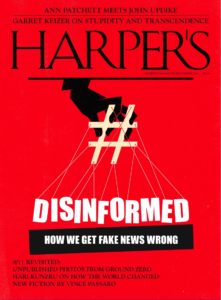Are we, the people, adrift in a sea of digital flotsam? Joseph Bernstein, a 2021 Nieman Fellow, has written a thought-provoking piece for Harper’s. He believes we are profoundly misinformed about social media’s role in keeping us misinformed.

Bernstein points to a 2019 Pew survey, showing that half of Americans think that made-up news/info is “a very big problem in the country today,” about on par with the “U.S. political system,” the “gap between rich and poor,” and “violent crime.”
“Why have we been so eager to accept Silicon Valley’s story about how easy we are to manipulate?”
Do we assign too much blame to the social media platforms for spreading disinformation? Are there not several other factors in play that deserve equal blame for the state of disarray today?
Facebook and Google and Twitter are easy targets for our collective angst. Maybe too easy. Why go there? Is it because we have no privacy any longer thanks to Google and Facebook? Or is it because these two companies have a license to print money?
How We See Ourselves
Bernstein paints a striking picture of modern American life and the typical social media user:
Every time she logs on to Facebook or YouTube or Twitter, she encounters the toxic byproducts of modernity as fast as her fingers can scroll. Here is hate speech, foreign interference, and trolling; there are lies about the sizes of inauguration crowds, the origins of pandemics, and the outcomes of elections.
She looks out at her fellow citizens and sees them as contaminated, like tufted coastal animals after an oil spill…
I do recognize the element of truth in the above claims. But, that’s not my everyday experience on Facebook, YouTube, or Twitter. Far from it. I guess it all depends where you look, who you associate with, and hang out with online. It also depends on your conduct. If you fire up a flame war, is it the fault of the platforms for allowing you to do so on their property?
Where the truth shines brightest is how much we love to judge others—especially people we have never met and never will meet. Domestic foreigners. People who don’t belong. Unreal Americans.
Hanging this on social media platforms is a mistake. It’s human nature to otherize the other, and when it comes to amplifying these actions, it’s conservative talk radio and Faux News who are most to blame. In fact, it’s hard for me to see how the propagandists on Faux News are not criminally liable, at least in part, for the destructive and illegal acts of their viewers.
Making Claims and Taking Names
“Mistaking correlation for causation has given ad buyers a wildly exaggerated sense of their ability to persuade,” Bernstein points out. He’s saying that both Facebook and the buyers of ads on their platform routinely overstate the efficacy of the ad buy.
Zuckerberg’s company profits by convincing advertisers that it can standardize its audience for commercial persuasion. How could it simultaneously claim that people aren’t persuaded by its content?
He comes back later with another body blow:
This is perhaps the deepest criticism one can make of these Silicon Valley giants: not that their gleaming industrial information process creates nasty runoff, but that nothing all that valuable is coming out of the factory in the first place.
Of course, Google and Facebook don’t produce much original content, furthering their claim that they’re not media companies. They claim to be advertising companies instead, and therefore guided by a different set of rules. But it seems to me that the companies are much more than advertising companies. Google and Facebook are the means by which people access the information they want to post and to read or interact with. So it’s fair to say that Google and Facebook are akin to the new Western Union or AT&T.
They “own the pipes” but not what’s in them. This doesn’t excuse them or remove them from responsibility for the content delivered via their pipes. With all the money they have in the bank, I’m sure Google and Facebook can find ways to solve the content problem. It seems that the desire to do so may be missing. Yet, if Russia’s intelligence operatives had used AT&T’s telephone lines the way they used Facebook in 2016 and again in 2020 to feed American citizens a steady diet of utter bullshit, AT&T’s negligence would have been obvious to all.
On the surface, the mystery is how Google and Facebook avoid regulation. Beneath the surface, the answers are rather mundane. The companies have massive lobbying teams in Washington, DC, and select state capitols. Like every other American business that needs a favor, they pay for it.
Discover more from Adpulp
Subscribe to get the latest posts sent to your email.



